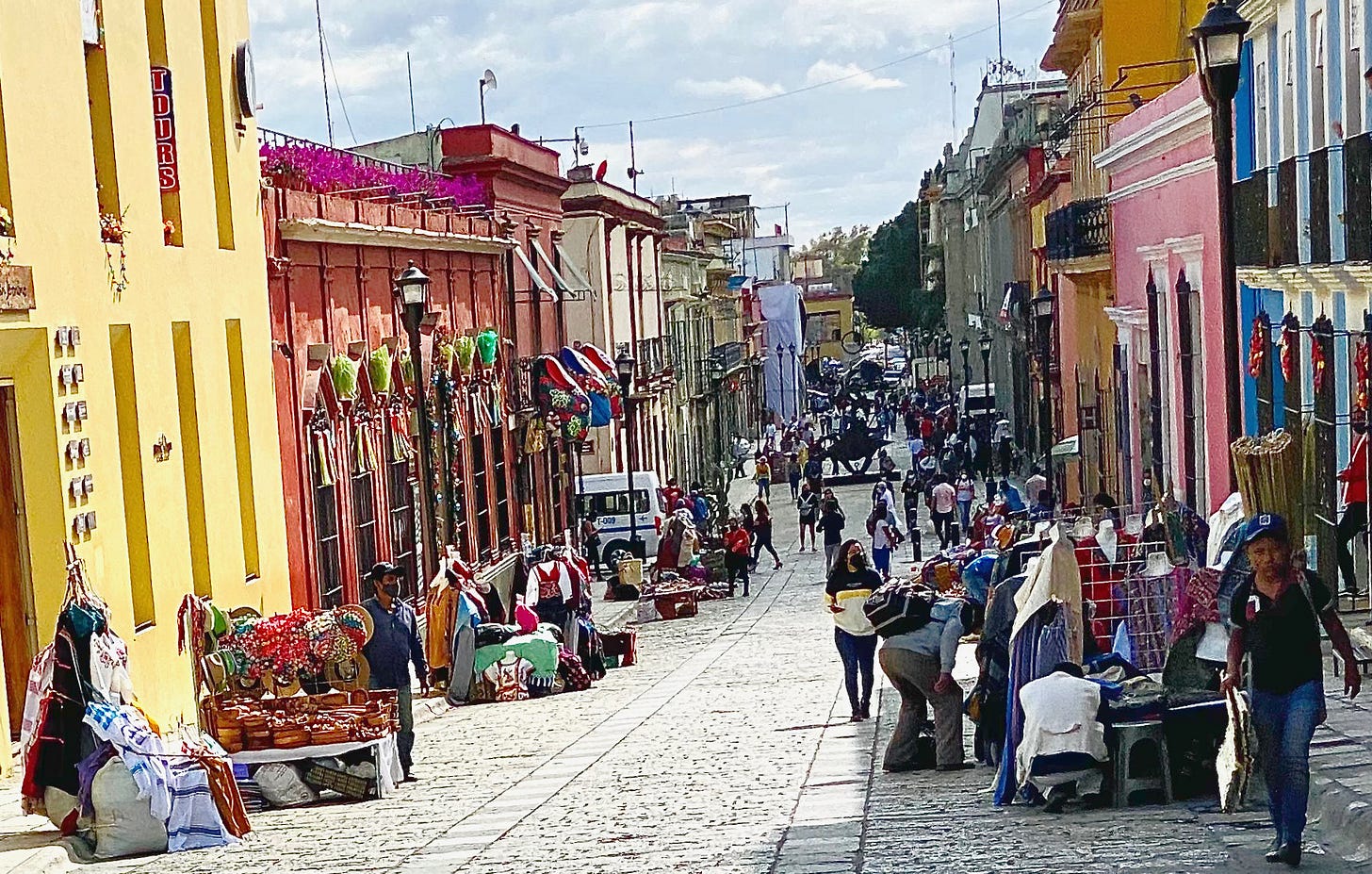Christmas in Oaxaca
An oasis full of life in a world obsessed with death
“For the present age illusion only is sacred, truth profane. The highest degree of illusion comes to be the highest degree of sacredness.” – Feuerbach, Preface to the second edition of The Essence of Christianity, 1848
One of the most salient questions for me in the current pandemic is why so many people have so willingly given up core freedoms and rights that took their forebears three millennia of cultural-political achievement and sacrifice to attain.
Except for a virtual $14.4 billion consumer election spectacle staged for television and social media in the US (the most expensive in US history) in which 14 million TV ads were run, all political life has essentially been shutdown in 2020. Indeed, authentic political expression is now illegal as epidemiology supersedes politics.
Italian philosopher Roberto Esposito observes that, “Politics has become medicalized. Giving doctors the task of political decision-making radically transforms the political arena, making deviance a pathological condition.” The historic passivity with which this new medicalized anti-politics regime has been accepted raises troubling life and death questions that go far beyond public health policy.
A central theme in the work of social psychologist and philosopher Erich Fromm was the conflict between what he believed was humanity’s inherent attachment to life (Eros) and the incessant attempts of a sick society to lure the individual into an embrace of death (Thanatos).
To paraphrase Fromm from The Sane Society, “In the past, the problem was that God is dead; in the present, the problem is that man is dead.”
Gender pronouns aside, is Fromm right? Is humanity losing its vital erotic attachment to life? A pervasive fear of death or obsession with morbidity such as in the current time does not equate to an active embrace of living. It is the opposite, especially when coupled with nearly complete political capitulation.
As I’m thinking and trying to contextualize the current global crisis and working on three different books for 2025 (see covers below), I’m in Oaxaca, México. I’ve been here for nearly a month and am spending Christmas with friends. Being in this historic city is a joy. Every day and every night, the streets are full of life. The state of Oaxaca has one of the lowest incidences of Covid in México.
People in Oaxaca do all of the things we’ve become accustomed to during this time – masks, hand sanitizer, distancing, etc. But it is done so casually, without drama of any kind, it almost seems natural.
Perhaps part of the reason Oaxaca has adapted so seamlessly during this turbulent moment is its unique ability to balance modernity and antiquity. As a UNESCO World Heritage Site for nearly five decades, and with a warm year round climate, the city is usually flooded with tourists. Yet in the face of this onslaught of globalization and consumerism, Oaxaca has somehow managed to keep many indigenous cultural and political traditions alive that are focused on community sharing and collaboration as a kind of counterweight to global capitalist monoculture.
Idealization is not needed to note the agreeable rhythm of daily life here, especially in the way that people interact with one another, always taking time to talk and listen. Globalized consumer culture, it seems to me, is consciously tempered by tradition and shared cultural history. Oaxaqueños seem to be adapting only the elements of modernity that work for them within their own cultural context.
Although Oaxaca is relatively poor economically, there is a richness in this communal sensibility that is worthy of attention. Walking the greater metro area of about 300,000 people, the calm and humanity at the center of the city stand in striking contrast to the typical frenzy and impersonality of much of modern life.
In The Sane Society, Fromm also commented that, “The danger of the past was that people became slaves. The danger of the future is that people may become robots.” This danger is much more profound and potentially lethal to humanity than the Coronavirus.
If as Sartre declared, humans are “condemned to be free” and are miserable because of it, often trying to escape the anguish and responsibility of making the choices that such intrinsic freedom demands, perhaps what is needed now is inspiration.
With so many people in thrall to fear, the joy of accepting one’s own freedom and the political responsibility that comes with it need to be reintroduced in ways that have the potential to rekindle Eros and erotic attachment to life.
Absent such a reaffirmation, the predicted “dark winter” of the new medicalized politics will be culturally and economically lethal in ways that are potentially irreversible.
To quote W.H. Auden on the eve of World War II:
Defenceless under the night
Our world in stupor lies;
Yet, dotted everywhere,
Ironic points of light
Flash out wherever the Just
Exchange their messages:
May I, composed like them
Of Eros and of dust,
Beleaguered by the same
Negation and despair,
Show an affirming flame.
As this hallucinatory fever dream of a year closes, I send you an affirming flame. Stay strong and embrace the beauty of life with passion.
BOOKS IN PROGRESS FOR 2025
NOTE: Photos & video by Michael Meurer




